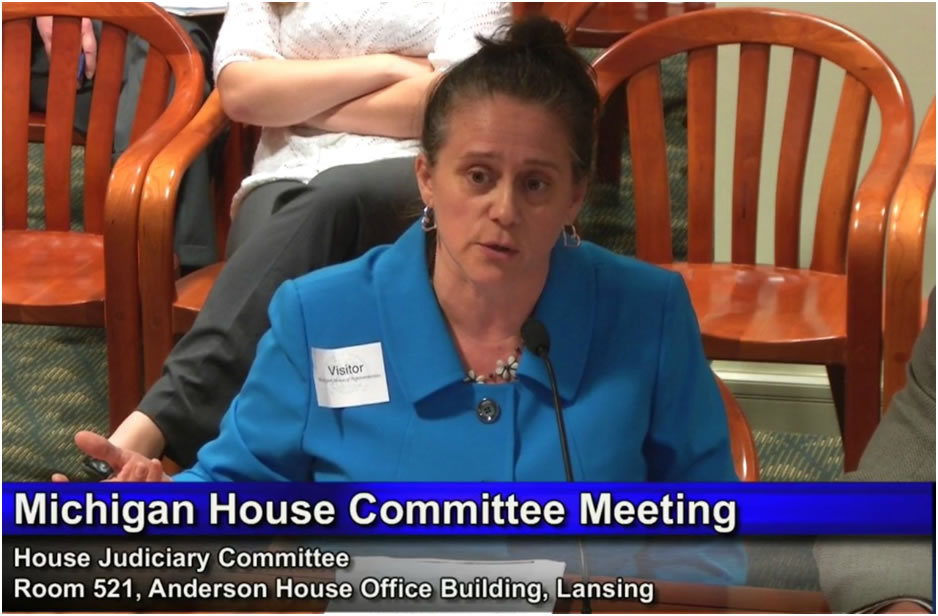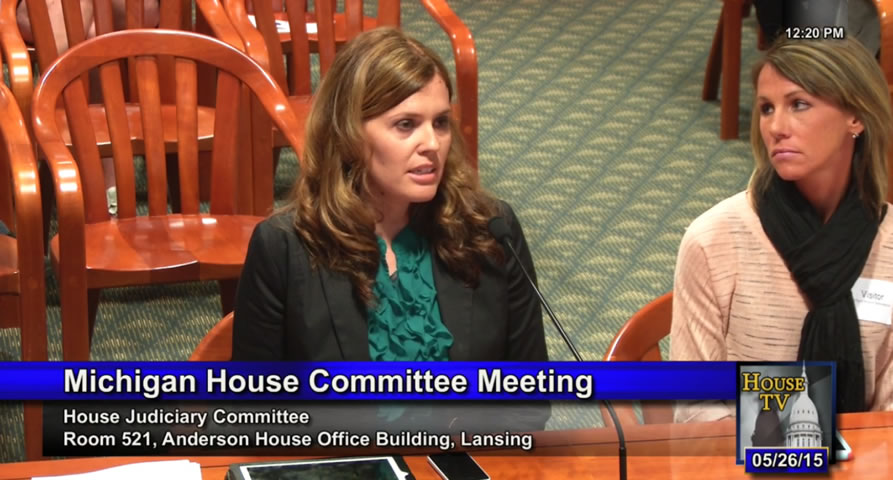
Jul 31, 2015 | Blog, Medical Marijuana Attorney Michael Komorn, News
Attorney Michael Komorn (center) and Former state lawmaker Tom McMillin (right) takes part in a discussion of alleged abuses by law enforcement drug task forces in Michigan.
Attorney Michael Komorn who specializes in Medical Marijuana participates in a meeting in Port Huron about how law enforcement drug task forces are abusing their power in Michigan.
Speaker after speaker claimed the raids by heavily armed police officers on their homes have resulted in extensive damage and scared their children. During the raids, they claim officers tried to intimidate them.
“It’s child endangerment. It’s sexual harassment. It’s excessive force. That’s civil rights violations,” claims Charmie Gholson, with Michigan Moms United. Gholson organized Tuesday’s meeting, which is the first of a series meetings planned around the state.
Former Republican state lawmaker Tom McMillin sat on a panel which asked questions of the speakers at the meeting.
“Some of this stuff sounds criminal that law enforcement is doing,” McMillin said during a break in the meeting.
There were no law enforcement officials at Tuesday’s meeting in Port Huron. Charmie Gholson says she intentionally didn’t invited the St. Clair County sheriff’s office out of concern that some of the people at the meeting would feel intimidated.
After a state House committee meeting last month where Annette Shattuck testified about her experience with the local drug task force, St. Clair County Sheriff Tim Donnellon told the Washington Post she lied about officers on the county’s drug task force.
“She’s a liar, plain and simple. That’s all I can tell you,” he said. He says that the task force did not hang lingerie from the ceiling fans or stomp food on the floor. The Shattucks, he said, are “trying to further their cause, which at the base of it is the legalization of marijuana in the state of Michigan.”
State lawmakers are looking at making changes to the law under which drug task forces operate.
The state House has passed a package of bills to add new reporting requirements and increase the burden of proof required to seize private property in drug raids.
The bills are currently before the state Senate.
Source: Michigan Radio.org
Original Article By Steve Carmody • Jul 29, 2015
If you or someone you know is facing charges as a result of Medical Marijuana recommended to you as a medical marijuana patient under the Michigan Medical Marijuana Act, contact Komorn Law and ensure your rights are protected.
Michael Komorn is recognized as a leading expert on the Michigan Medical Marihuana Act. He is the President of the Michigan Medical Marijuana Association (MMMA), a nonprofit patient advocacy group with over 26,000 members, which advocates for the rights of medical marijuana patients and their caregivers. Michael is also the host of Planet Green Trees Radio, a marijuana reform based show, which is broadcast every Thursday night 8-10 pm EST. Follow Komorn on Twitter.
Contact us for a case evaluation at 800-656-3557

Jul 22, 2015 | Blog, Medical Marijuana Attorney Michael Komorn, Michigan Medical Marijuana Act, Michigan Medical Marijuana Association, News
Activists are screaming mad at the conduct of officials representing Governor Rick Snyder’s administration during a hearing today to determine if autism should be added to the list of illness that qualify a patient to use medical marijuana in Michigan. The petition, submitted in 2014, contains a summary of 75 peer-reviewed articles on autism and 800 pages of reference material. ”When the panel sat down today, what they had was pieces of the document,” said Southfield attorney Michael Komorn. Pieces apparently selected by the Attorney General’s office, according to statements made on the record by Board officials. What was missing? “The Summary, with the 75 peer-reviewed studies, and the 800 pages of clinical research on autism and cannabis,” Komorn said. Advocates sued the government in Ingham County Circuit Court to force the Department of Licensing and Regulatory Affairs (LARA) to consider a petition for that purpose submitted in 2014 by Lisa Smith, whose son Noah has autism and other illnesses. Petitions are debated by the Medial Marihuana Review Panel (the Board) under rules established in 2008 by the Michigan Medical Marihuana Act (MMMA). A previous petition to add autism to the MMMA was rejected at a Board hearing back in 2013. “We litigated for a year,” to get the Smith petition accepted, Komorn said. The State was represented by the Office of the Attorney General, Bill Schuette. The language of the MMMA requires that each petition properly submitted must be considered by the Board. Schuette’s and LARA’s response was the opposite: we already ruled on that illness and no subsequent petition will be considered. “The Court decided theirs was a wrong interpretation. We won; they had to give us a new hearing on the petition submitted.” A hearing on the Smith petition was held in May of this year. On July 1 a whole new Board was created, per rule changes made in January 2015 by LARA over the objections of citizens and Senators. Some of the members of the new panel had not heard the testimony on the Smith petition taken by the Board weeks earlier. “When the Board assembled today we were expecting a vote yea or nay on the petition,” Komorn related. “Before we were able to begin the conversation it was brought to the attention of the Board as a whole by (Board member) David Brogren that this very comprehensive document with supporting papers was not given in its entirety to the Board, and that the Board should consider the entire package before voting.” The science was scrubbed from the document given to the Board for consideration, Komorn said. “When the Circuit Court made an order that the petition be considered, they meant the whole petition,” Komorn growled. ”(The Court) didn’t change the material submitted, it required the Board to consider the petition filed with the Court.” Of a greater concern is the reason cited for the edited version of the petition being presented. Along with a new Board comes a new leader, and the newly-appointed Board made selecting a new Chair their first priority. When the confusion regarding the petitions was exposed, her reaction was not one that inspired confidence among the hearing’s attendees. “The statement she made on the record was very distressing, that this information was given to the board by the Attorney General, not the Court,” Komorn said. “The Attorney General’s role was referenced by (the Chair), who said, in response to Brogren, this is what was sent to us by the Court via the Attorney General.” “The representative kept referring to the fact that this document is what the Attorney General’s office gave us,” said Jamie Lowell of Ypsilanti’s 3rd Coast Medical Marijuana Dispensary, who attended the hearing. Brogren mentioned on the record that he had given the Board the petition in its entirety two weeks ago. Even after the issue was exposed, Komorn said the Chair seemed more concerned with spin control than she was with establishing proper process. Komorn explained that “she kept insisting that the Board had all the information they needed to make a decision on autism and medical marijuana,” he said, “without seeing any of the science behind it.” Brogren’s objections to considering the issue without all the facts swayed the result and stayed the Board from voting. They will reconvene at a later date to make a final determination on the Smith petition, after receiving the entire document. In addition to being a criminal defense attorney, Komorn is the host of an Internet-base radio program broadcasting weekly for more than four years. The Planet Green Trees Radio Show (PGT) has followed the progress of the autism petition from the start, prior to 2012’s initial rejection. Shows #255 and #257 covered the topic with interviews and behind-the-scenes looks at the tribulations experienced by those advocates who sought a positive result at the July 20 hearing. One of those interviewed by the PGT staff: Dr. Harry Chugani, chief of pediatric neurology at Children’s Hospital of Michigan in Detroit “There was a major flaw in the process of how information was being given to the Board members,” Komorn stated. He challenged the notion that the Attorney General, a noted medical marijuana detractor and a major opponent of the MMMA in 2008, should be filtering information approved by the Court for use by a state agency. “Mind you, the AG had to be sued to bring this information to the Board in the first place,” Komorn emphasized. “Why is it OK for the Director of this Board to rely on them for the information used to make the determination of autism’s validity for inclusion on the medical marijuana program?” As a barometer of governmental efficiency, Komorn gave the Board’s actions today two thumbs down. “This Board is not operating in a way that anyone in the public would appreciate… this behavior should do nothing but bring concern from citizens… I don’t think that anyone that walked out of that room has one bit of confidence in the integrity of the process.” “I’d like to believe in the possibility of a fair hearing, but after experiencing the Attorney General in action over the years I can’t help but believe today’s behavior, creating unnecessary confusion and restriction, is intentionally designed to lead to a negative outcome,” Lowell observed. “I really hope I am wrong.”
Source: The Compassion Chronicles by Rick Thompson at 6:15 AM on July 21, 2015

Jul 22, 2015 | Medical Marijuana Attorney Michael Komorn, News, Uncategorized
A blog article from the Metro Times by Larry Gabriel features a quote by Attorney Michael Kormorn.
Some excerpts from the article…
Last week the Detroit Medz shop on Detroit’s west side was raided for “selling marijuana outside the provisions of the state medical marijuana act,” says Sgt. Cassandra Lewis of the Detroit police media relations department. News reports said police found two guns, 4,100 grams (about 9 pounds) of marijuana, and arrested one person — although Lewis says two individuals were arrested that evening.
Lewis says that there were complaints from the community and that police previously had made undercover buys there, although it’s not clear if those undercover buys were made by people with state cards (or fake ones as has been done in the past) or by folks who just walked in with nothing to show.
So far no charges have been announced.
Tate has had Winfred Blackmon and his Metropolitan Detroit Community Action Coalition (MDCAC) riding his ass for several months regarding dispensaries in the city. I went to a couple of meetings early on and have been receiving Blackmon’s email alerts since then. Early on, it was obvious that MDCAC members didn’t want to see marijuana, medical or otherwise, in their neighborhoods. They have an old-school attitude. Early on, their complaints included the fact that most dispensary locations painted their storefronts green — as if that matters.
MDCAC has been pushing Tate, who represents District 1, to do something about what they call “illegal marijuana provision centers.” They’ve been riding city attorney Butch Hollowell too.
Truthfully, the city has been slow to address the issue. I’ve noticed a distinct tendency to avoid talking about marijuana by city officials while places such as Ann Arbor, Ypsilanti, Lincoln Park, and elsewhere have set up rules regarding dispensaries. Now those cities have not been going through their mayor being indicted and convicted, switching from an at-large to a district city council system, having an emergency manager, and a bankruptcy. However, it would be good from a number of viewpoints to set the rules about dispensaries.
That said, the MDCAC model is not a liberal one. Although over time, as they have come to accept that medical marijuana is not going away, they have lightened up some. Originally, they wanted only one dispensary per council district, which would mean only seven in the entire city. Their current proposal seeks to limit the number of dispensaries and limit their locations to industrial zones, mandates that they cannot be near a church, school, daycare or nursery, and proposes a number of inspections and permits before they can open.
This may be a case of the squeaky wheel getting the oil.
“They chose this very uncivilized manner to try to make an example of this one particular facility,” says Southfield-based attorney Michael Komorn, who heads the Michigan Medical Marijuana Association. “There is no rule prohibiting [a location near a school], no rule. … Maybe that’s something they should think about doing — regulate this in a way that satisfies the community.”
Maybe the Detroit Medz folks were selling to people who aren’t registered patients, but the rest of this seems to be pure political theater.
Larry Gabriel writes the Stir It Up and Higher Ground columns for the Detroit Metro Times.
Read Full Article Here

Jul 16, 2015 | Criminal Defense Attorney Michael Komorn, Marijuana Criminal Defense Attorney Michael Komorn, Medical Marijuana Attorney Michael Komorn, News
The Detroit police raided and made arrests at marijuana dispensary in an article in the Detroit Free Press from July 14, 2015.
Detroit police arrested two people and confiscated two firearms and drugs during a raid on a marijuana dispensary Tuesday afternoon.
Police seized 4,100 grams of marijuana (about 9 pounds), and removed 12 edible marijuana foods from the shelves at Detroit Medz, said Sgt. Cassandra Lewis of Detroit police Media Relations.
According to state law, only Michiganders who possess state registry cards can legally use medical marijuana, but at the shop “they were just selling to anybody who walked in,” she said.
Detroit does not have an ordinance regulating dispensaries. Detroit police favor having dispensaries be regulated, “so that it’s safe not just for the customers but also for the community,” Lewis added.
A local ordinance, spelling out what Detroit authorities expect of the city’s dispensaries, would protect legitimate operators and weed out any that are undesirable, added Southfield attorney Michael Komorn, president of the Michigan Medical Marijuana Association.
But without such regulation in place, Tuesday’s raid was ill-advised because Detroit police should focus on violent crime – not dispensaries, Komorn said.
“I can’t speak to this specific location, but there’s a lot of dispensaries operating in Detroit and it’s unfortunate that Detroit’s leaders and citizens seem to be at odds about whether they should be there. Some people still see medical marijuana as just dope,” he said.
“These places are not causing lawlessness and they’re not hurting property values in the city,” Komorn said.
Some law enforcement agencies claim all dispensaries are illegal until the state Legislature passes a law allowing them. State Attorney General Bill Schuette agrees with that assessment.
The city of Detroit is overdue for regulating its fast-spreading dispensaries, said Winfred Blackmon, a community leader in northwest Detroit who is outspoken about medical-marijuana commerce.
Read the article here Detroit Free Press Article – Detroit Dispensary Raid

Jun 4, 2015 | Criminal Defense Attorney Michael Komorn, Komorn Law Blog, News
The headlines read…
“How a sex toy put national spotlight on Michigan civil asset forfeiture laws targeted for reform”
“State Legislators Reconsider Forfeiture Laws That Turn Cops Into Robbers”
“Why Take My Vibrator?” Cops Legally Rob “every Belonging”
It’s been featured on many news outlets large and small.
Some of the main ones include Fox, MLive, Forbes, Washington Post, MMMA, and so many more.
Ginnifer Hency says that a police raid led investigators to seize a couple of guns, a small amount of cash and cell phones , medical marijuana. And also something very personal…
“My medicine for my patients, why a ladder, why my vibrator, I don’t know either,” Hency said during a Michigan House Committee meeting.
Click to play video
Ginnifer Hency’s vibrator was not an accessory to an alleged crime that a judge says did not occur. And that last part is creating quite a story that has now gone viral and raising questions about Michigan’s civil asset forfeiture laws.
“They’ve had my stuff for 10 months now,” Hency said.
Ginnifer and her husband Dean Hency say it all happened when their home was raided last July. They both are licensed medical marijuana patients and caregivers. They claim to be targeted by St. Clair County’s drug task force.
It began when Ginnifer says she walked into a medical marijuana licensing facility as it was being raided. “They asked me how much medicine I had in my backpack,” she said. “I said six ounces then they said to get a warrant for our house.”
The havoc they wreaked,” Dean said, “they just threw stuff around. Just dirt dumped all over the place.” “We were in complete compliance with the Michigan Medical Marijuana Act and they destroyed my house,” Ginnifer said.
But St. Clair County Sheriff Tim Donnellon says they were not, and added that officers did not take her vibrator and would never have a reason to. He says aside from that allegation, the task force’s actions were justified and par for the course.
Even so, a judge (read the courts opinion here – specifically the last page regarding Hency) dismissed the criminal charge of possession with intent to distribute against Ginnifer Hency two weeks ago. But here’s what she says happened when she went to the prosecutor’s office to get her property back.
“Lisa Wisniewski who is the assistant prosecuting attorney said ‘I can still beat you in civil court, I can still take your stuff.”
Michael Komorn who is the Hencys’ lawyer said. “This is bully tactics, we have your property we couldn’t get any charges to stick, we’re just going to keep it and drag it out.”
“Here’s a person who they took her property and they couldn’t even make the charges stick let alone get a conviction. So if there’s an example of why there needs to be reform it’s this.” added her attorney Michael Komorn.
“They left my (equipment) I used to grow ‘drugs’ – they left that,” Hency said when she testified. “Now that is what the state forfeiture laws are made for.” The St. Clair County Prosecutor’s Office has about a week to appeal a visiting judge’s decision to drop those charges against Ginnifer Hency.
When she heard that, Hency said, “I was at a loss. I literally just sat there dumbfounded.”
Hency told her story at a meeting of the Michigan House Judiciary Committee, which was considering several bills that would make this sort of legalized larceny more difficult.
She was joined by Annette Shattuck, another medical marijuana patient who was raided by the St. Clair County Drug Task Force around the same time.
“After they breached the door at gunpoint with masks, they proceeded to take every belonging in my house,” Shattuck said.
The cops’ haul included bicycles, her husband’s tools, a lawn mower, a weed whacker, her children’s Christmas presents, cash (totaling $85) taken from her daughter’s birthday cards, the kids’ car seats and soccer equipment, and vital documents such as driver’s licenses, insurance cards, and birth certificates.
“How do you explain to your kids when they come home and everything is gone?” Shattuck asked. She added that her 9-year-old daughter is now afraid of the police and “cried for weeks” because the cops threatened to shoot the family dog during the raid.
Although “my husband and I have not been convicted of any crime,” Shattuck said, they cannot get their property back, and their bank accounts remain frozen.
Last February The Detroit Free Press highlighted various other examples of the cruel, greedy pettiness fostered by civil forfeiture laws, which allow police to take assets allegedly linked to crime without so much as filing charges, let alone obtaining a conviction.
“Police seized more than $24 million in assets from Michiganders in 2013,” the paper noted. “In many cases the citizens were never charged with a crime but lost their property anyway.”
Now a bipartisan group of state legislators is trying to reform the laws that have turned Michigan cops into robbers.
The bills, which are backed by House Judiciary Committee Chairman Klint Kesto (R-Commerce Township), would require law enforcement agencies to keep track of all forfeitures and report them to the state police, prohibit the forfeiture of vehicles used to purchase small amounts of marijuana, and raise the standard of proof for forfeitures in cases involving drugs or public nuisances.
“We must bring culpability and transparency to the system and rein in the ability of police to indiscriminately seize the property of innocent citizens,” Kesto says.
Michigan was one of five states that received a D–, the lowest grade awarded, in a 2010 report on forfeiture abuse from the Institute for Justice. Michigan’s “preponderance of the evidence” standard, which allows the government to complete a forfeiture based on any probability greater than 50 percent that the asset is connected to a crime, was one reason for that low grade.
Bills introduced by Rep. Peter Lucido (R-Shelby Township) and Rep. Gary Glenn (R-Midland) would instead require “clear and convincing” evidence, which is more demanding than the current rule but not as strict as “beyond a reasonable doubt,” the standard in criminal cases.
None of the bills addresses another major problem with forfeiture in Michigan:
Law enforcement agencies keep 100 percent of the loot, which gives them a strong incentive to target people based on the assets they own instead of the threat they pose to public safety.
Testifying (play video) before Kesto’s committee on Tuesday, Charmie Gholson, founder of Michigan
Moms United, argued that cops’ financial stake in forfeitures helps explain why the arrest rates for consensual crimes involving drugs and prostitution are so much higher than the arrest rates for violent crimes such as rape, robbery, assault, and murder.

Charmie Gholson (Image: Michigan House of Representatives)
In Michigan, Gholson said, the arrest rate (the share of reported incidents that result in an arrest) is 82 percent for prostitution, compared to 44 percent for murder, 39 percent for felonious assault, 21 percent for robbery, and 15 percent for rape. “It’s because when they catch you with a prostitute, they take your car,” she said. “Civil asset forfeiture decreases public safety.”
Gholson thinks money from forfeitures should go into the general fund, which would eliminate such perverse incentives. She also argues that forfeiture should require a conviction based on proof beyond a reasonable doubt, which would effectively abolish the practice of civil (as opposed to criminal) forfeiture. The Institute for Justice, which has been fighting forfeiture abuse for years, agrees.
Both of those reforms were recently adopted by New Mexico, which got a D+ in the 2010 Institute for Justice report. The New Mexico law also bars police and prosecutors from evading state limits on forfeiture by pursuing seizures under federal law through the Justice Department’s Equitable Sharing Program.
Last month legislators in Montana, which like New Mexico got a D+ in 2010, likewise voted to require a conviction prior to forfeiture.
But police and prosecutors in Montana will continue to keep all the proceeds from forfeitures, and they are still free to engage in joint forfeitures with the feds, which are subject to a lower evidentiary standard.
Compared to the reforms in New Mexico and Montana, the changes proposed in Michigan are pretty modest. But forfeiture critics hope the new comprehensive reporting requirement will set the stage for more ambitious reform by showing how the profit motive warps law enforcement priorities.
“You need more details about how seizures are happening,” Lee McGrath, legislative counsel at the Institute for Justice, told the Free Press. He said such data will expose the myth that “these forfeitures target big international criminal syndicates.” McGrath called the bills “a solid first step toward the ultimate goal of ending civil forfeiture.”
Michael Komorn is recognized as a leading expert on the Michigan Medical Marihuana Act. He is the President of theMichigan Medical Marijuana Association (MMMA), a nonprofit patient advocacy group with over 26,000 members, which advocates for medical marijuana patients, and caregiver rights. Michael is also the host of Planet Green Trees Radio, a marijuana reform based show, which is broadcast every Thursday night 8-10 pm EST. Follow Komorn on Twitter.








